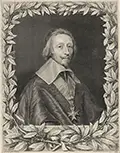Cardinal Richelieu: the Power behind the State
Part 1: To the Pinnacle of Power Cardinal Richelieu was one of the most famous government ministers in French history. Chief minister to Louis XIII, he set up many well-known systems and institutions and paved the way for the absolute monarchy of Louis XIV. 
He was born on Sept. 9, 1585, in Paris. His name at birth was Armand Jean du Plessis. A sickly child, he struggled with ill health throughout his life. His father, François, was the chief magistrate for King Henry III and was serving under his successor, Henry IV, in 1590 when he died. Despite his high governmental position, François did not leave his famiy with much money and so Suzanne de La Porte took Armand and her other four children to live with her mother. When he was 9, young Armand attended the College of Navarre, training for a career in the military. He arrived in the clergy by a roundabout way. Henry III had granted his family the bishopric of Lucon in return for Francçois's service to the crown during the Wars of Religion. Armand's other brother Alphonse declined the offer, and so Armand offered to take his place. Henry IV nominated him for the position in 1606, but he was too young and so had to get a dispensation from the pope. Thus approved, Armand was consecrated in 1607. He came to be known as Richelieu after the king created the title of Duke of Richelieu just for him. Richelieu first gained a name for himself by implementing a number of reforms set out by the Council of Trent, a gathering of Catholic leaders in response to the growing opposition of leaders of the Reformation. He gained in stature and, in 1614, was selected as a member of the clergy at the Estates-General, a gathering of representatives of the Three Estates of France: (in hierarchical order) clergy, nobility, and peasants. 
By this time, France had a new monarch. Henry IV had died in 1610, by an assassin's hand. Succeeding him on the throne was Louis XIII, who was not of sole ruling age. His mother, Marie d'Medici, served as regent for a few years. One of the Queen Mother's most trusted advisors was Concino Concini, an Italian nobleman. Richelieu served Concini and, in time, also the Queen Mother, being named Secretary of State for Foreign Affairs and for War in November 1616. (Richelieu's first royal assignment had been as chapel to Louis's queen, Anne of Austria.) After a time, king and Queen Mother disagreed on which ministers to listen to and Louis chose Charles de Luynes. As twin safeguards, the king targeted Concini, marking him for execution, and sent his mother into exile. Richelieu, having lost his benefactor and his royal champion, also found himself with no royal favor, for the king had banished him to Avignon. Marie d'Medici returned from exile in 1619, at the head of an armed rebellion. To keep the peace, the king recalled Richelieu and asked him to forestall any more conflict between son and mother. He did so, and the queen traded her role as rebel for a place on the royal council. Luynes died in 1621, and Louis named Richelieu his First Minister of State. He served in that capacity for the rest of his life. Next page > Statesman Extraordinaire > Page 1, 2 |
|
Social Studies for Kids
copyright 2002–2026
David White




